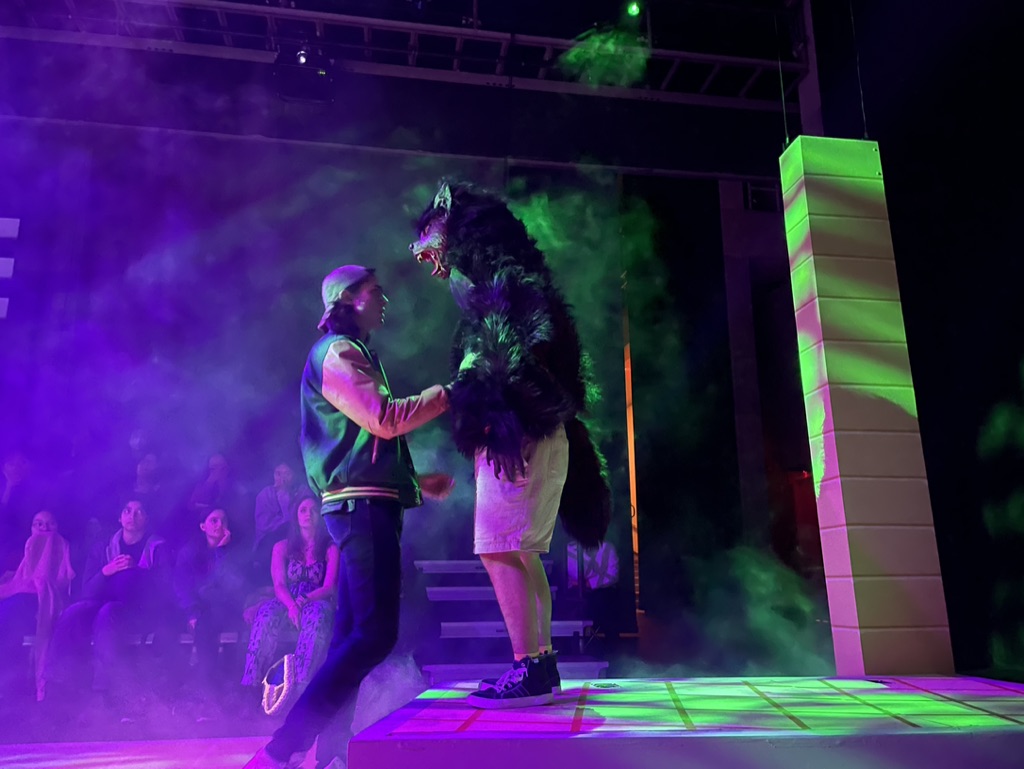
c/o Caleb Henning
Trigger warning: This article contains mentions of sexual violence, homicide, eating disorders, and bullying/harassment.
“WOLFCRUSH (A QUEER WEREWOLF PLAY IN THREE ACTS)”—a play written by Haygen-Brice Walker and directed by Visiting Assistant Professor of Theater Alex Keegan—was performed in the Center for the Arts (CFA) Theater on Thursday, Nov. 9 at 8:00 p.m.; Friday, Nov. 10 at 8:00 p.m.; and Saturday, Nov. 11 at 2:00 p.m. and 8:00 p.m. The play focuses on four teenagers grappling with their burgeoning queerness in the fictional small town of White Coon County.
The story begins with a monologue from the town mayor (April Schwartz ’24) announcing that a large number of livestock have recently gone missing from farms all over town, a story beat that primes the audience to be ready for werewolves to appear later on. We’re introduced to the four teenagers—Kyle (Bailee Gull ’24), Junyce (Ella Kramer ’26), Huck (Leo Kaplan ’26), and Beecher (Leo Marin ’27)—and their dynamics fairly early on, establishing the character-driven narrative. Although Kyle and Huck are in a straight relationship, Kyle falls in love with Junyce and Huck falls in love with Beecher. All three of the relationships shown in the play are fairly sexual, an aspect of the play that initially shocked both the audience and Gull, who performed as Kyle as part of her senior thesis in acting.
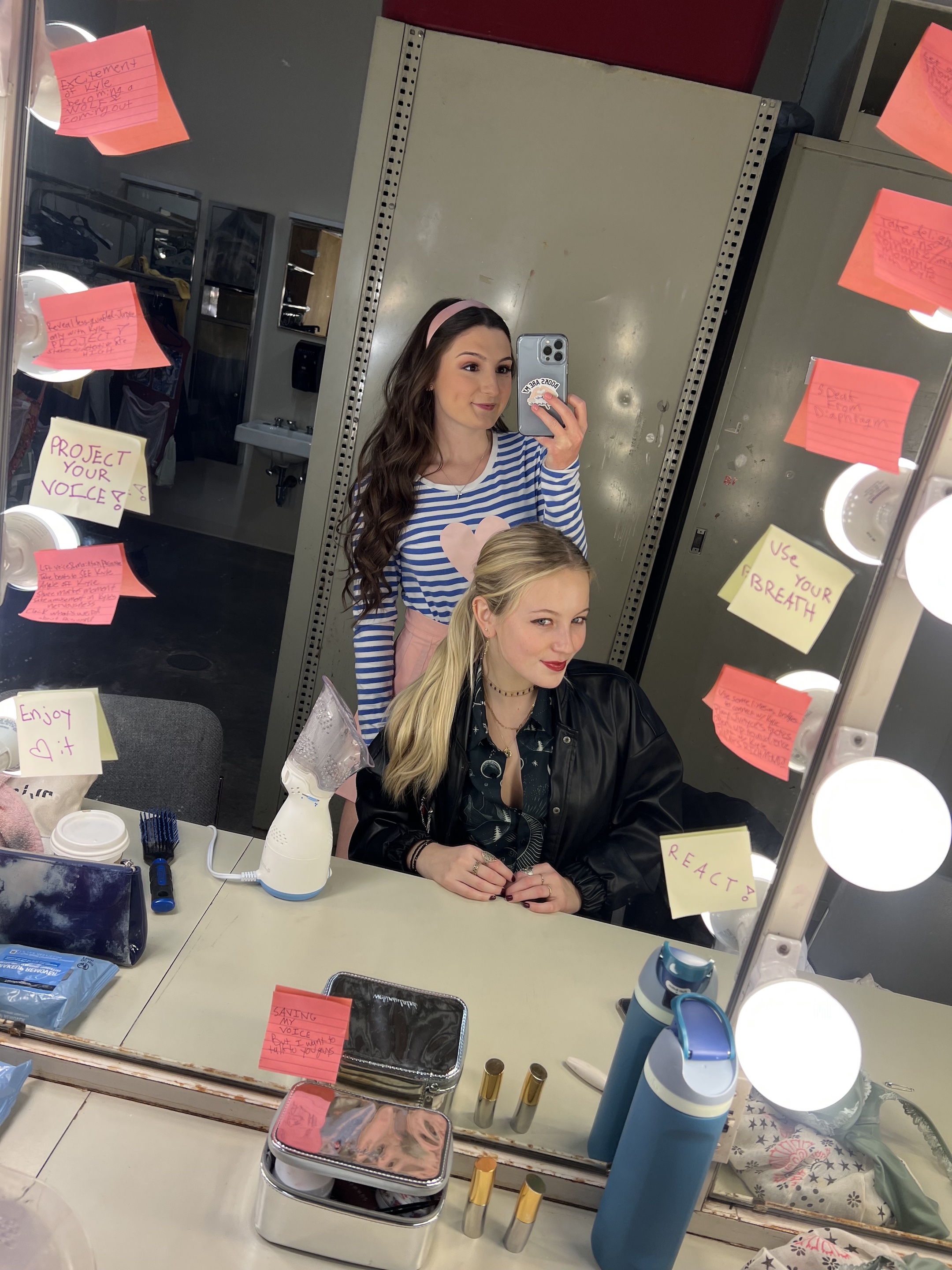
c/o Bailee Gull ’24
“When they first sent me the script to read for my thesis, I read it and I was like ‘I cannot do this. How is Wesleyan doing this?’” Gull said. “I think that my anxiety with jumping into those scenes decreased the more that I got to know Ella and Leo, ’cause they were the two that I interacted with the most.”
None of the actors were asked to perform in any scenes that made them feel uncomfortable, and the rehearsal process didn’t include the sexual scenes until after the actors had gotten to know each other and their boundaries. Kaplan mentioned that an entire scene was cut because the actors and Keegan agreed that it was unnecessary.
“In the script, it’s written out that there’s like a full penetrative sex scene between like the Wolf and Huck,” Kaplan said. “And that’s not something we actually did…. There’s more acting where I just make this face of looking around to see if anybody’s there. And so then that’s going back to more of the acting rather than actually having to show that.”
As Huck and Kyle deepen their relationships with Beecher and Junyce, they rebel against the inherent queerness of these relationships by treating Beecher and Junyce poorly. Kyle bullies Junyce for having an eating disorder in an effort to get her attention, and Huck continually calls Beecher weird and tells him he’s ruining their friendship, even though Huck is the one to make the first move every time. Because of these unhealthy dynamics, it was a bit difficult to root for their relationships, which had sweet moments here and there that we would’ve loved to see more of. Huck and Kyle were consistently shown as borderline abusive towards Beecher and Junyce as they violently externalized the internalized homophobia they were grappling with.
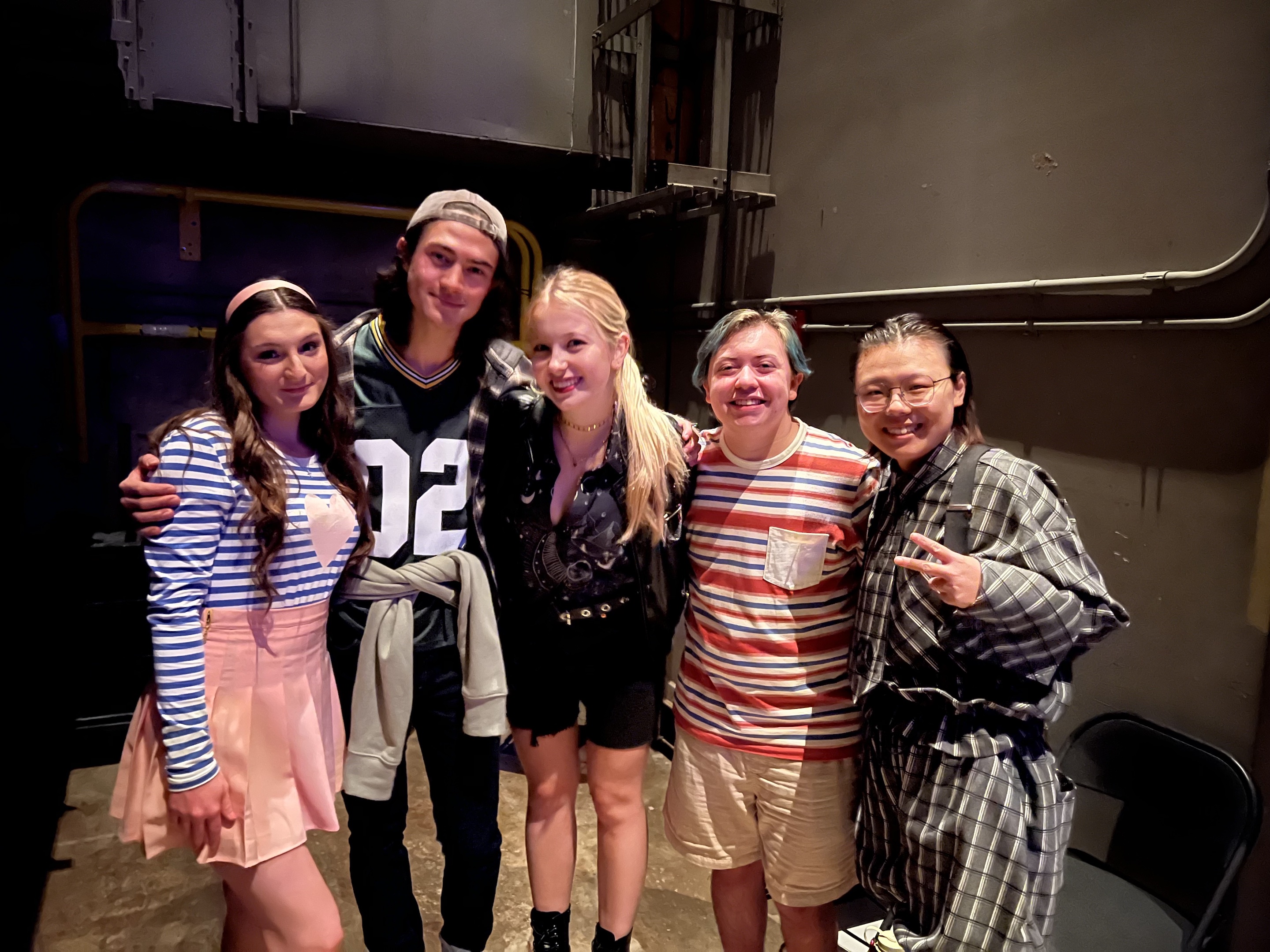
c/o Bailee Gull
In the midst of all of the conflict between the four main characters, Billy—Kyle’s ex-boyfriend who assaulted her—disappears. After a “Law and Order”-inspired interrogation scene lead by the town detective (Liang Liang ’26), Beecher admits to Huck that Billy was his boyfriend, that they were hooking up in the woods, and that he believes he accidentally turned into a werewolf and killed him. This is the only time Beecher comes out to anyone in the play. The only other time his queerness is recognized is when Junyce, with her keen werewolf senses, notices that Beecher is also a werewolf and declares herself as the alpha wolf. This establishes the werewolf as a symbol for queerness, as both identities lead to the characters being othered in the show and fearful of social repercussions.
The two relationships reach very different conclusions at the end of the show. Beecher turns into a werewolf for all of the third act and hooks up with Huck in werewolf form. Afterwards, Huck attempts to come out to the school principal (Ting Tsai ’27), who ridicules the idea of a football quarterback liking boys, which eventually leads to Huck killing Beecher, then taking Marin’s werewolf costume and putting it on himself while sobbing. Kyle accepts her queerness and love for Junyce by hooking up with her in the woods (first as a person, second as a werewolf) and the final lines in the show are the two girls howling into the night. Huck’s inability to accept himself in a straight-dominated world was an incredibly important part of the character for Kaplan, who is a queer person himself.
“Huck has this realization about himself that he is [queer] and then tries to come out and is ultimately rejected,” Kaplan said. “He tries to then be straight again and ultimately can’t do it and kills Beecher and the idea with him walking off in the end is just that he can never be [himself] and he has to live his life pretending. I think just being myself, I understood the difficulty in coming to terms with sexuality and coming out.”
While there are four queer characters in the show, Junyce is the only one who is out, something that was incredibly important for Kramer while playing her.
“I identify as bisexual, which I’ve personally known for a while, but I only came out semi-recently and I’m still figuring out how I feel about my identity and how I choose to express it,” Kramer said. “I’ve always been assumed as straight by other people and told I’m straight-presenting, so it’s very cool to embrace the character of Junyce who has this identity that she’s a lot more forward with her queerness.”
The concept of “WOLFCRUSH” materialized from deeply personal experiences and emotions that marked the playwright, Haygen-Brice Walker’s formative years. Walker grew up as a closeted gay Puerto Rican in a small Virginia town that closely mirrors White Coon County. As a result, “WOLFCRUSH” can be looked at as a sort of biography of Walker’s own personal life.
“Wolfcrush is my play about all those strange, secret, sleepness teenaged-nights as a closeted gay Puerto Rican in the swampy backwoods of Disputanta, Virginia promising myself that if I didn’t kiss him back: it wasn’t gay,” Walker wrote on his website.
This review would be incomplete without mentioning the phenomenal stage setup for “WOLFCRUSH.” Rather than having audience members sit in front of the stage, the stage was in the middle of both seating areas, giving the audience a more immersive experience. With the intimate seating arrangement, it was easy to focus on the incredible acting—especially by Gull, Kaplan, Marin, and Kramer, who embodied their characters so well that we were hung on their every word—and how the technical elements perfectly complemented it. The show also featured the clever use of screens to display text messages between the characters during scenes and transitional text announcing scene and act titles, providing a contemporary and realistic touch to the storytelling that kept the audience engaged.
These projections were incredibly well done, and perfectly complemented by alternatively realistic and otherworldly lighting, both designed by Assistant Professor of the Practice in Theater Courtney Gaston and assistant designed by Luciel Sanchez ’24 and Henry Owens ’25. All of the images were outlined in incredibly dark lines and made to look almost like they were drawn in watercolor-style markers, reminding the audience that the world we’re watching the actors inhabit isn’t quite real. The lighting and projection were perfectly complemented by the sound elements in the show designed by Simon Sidney ’27. The musical stings during transition shots and sound effects for texting noises that matched up with projected text messages were especially impressive.
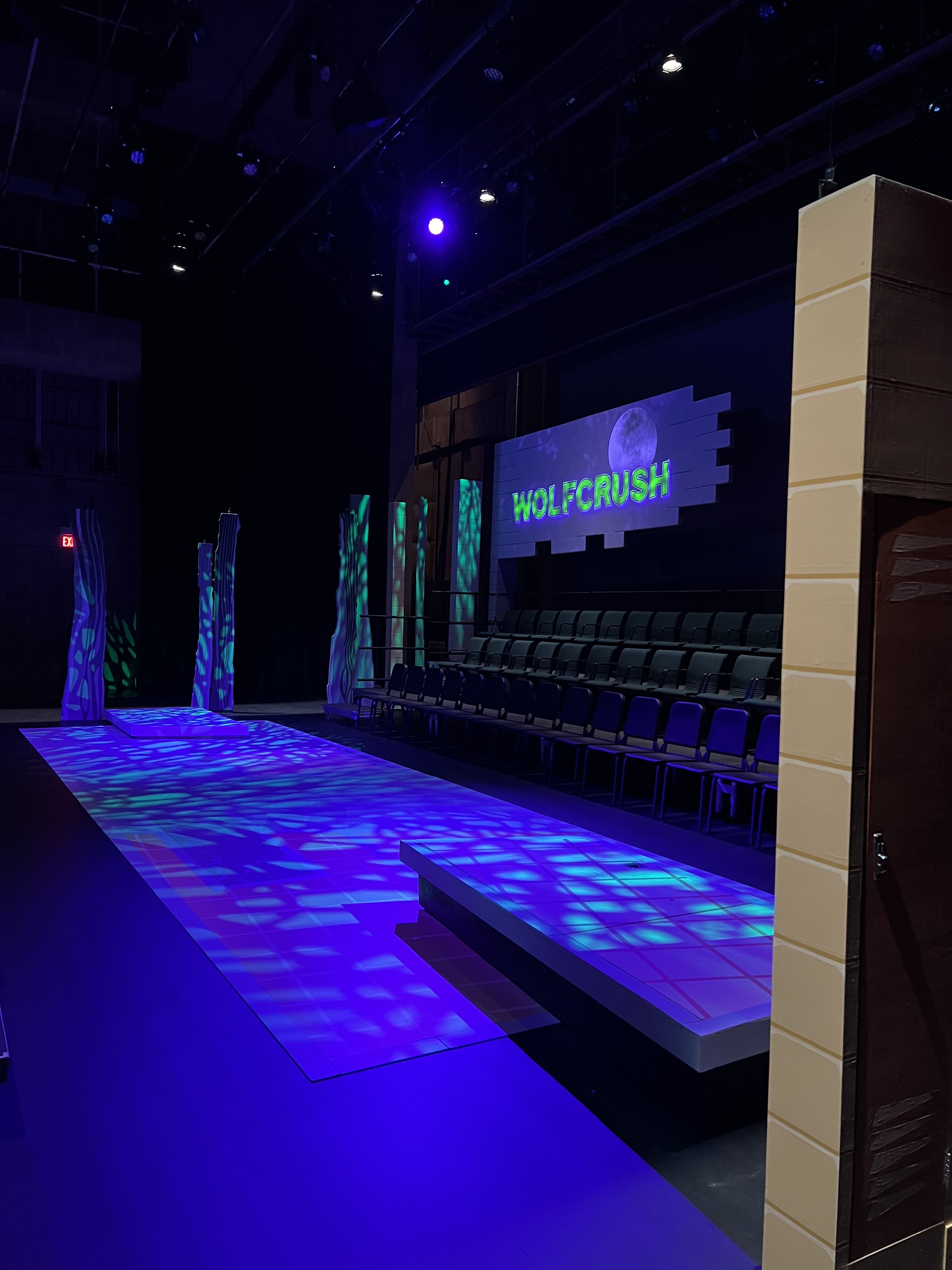
c/o Bailee Gull ’24
Additionally, the two werewolf costumes were incredible, each one complete with claws, sharp teeth, and a tail, designed by Assistant Professor of the Practice in Theater April Hickman. The cast adored the costumes and lovingly named them Clarence (boy wolf) and Gertrude (girl wolf).
Marin was the only actor who had to wear the wolf costume for multiple scenes—when he first hooks up with Huck in wolf form and during their final confrontation that leads to his eventual death—and he discussed what it felt like to wear the costume.
“[It] was super heavy,” Marin said. “During the scene it was fine, I wasn’t thinking about it. But…the end of the first act three scene is me turning into a wolf and then I go backstage and I don’t have another scene until the last scene of act three. I didn’t have time to fully take it off and then put it back on…. So I would just go back backstage and lie down until my last scene ’cause it was a lot of weight on my head.”
Despite all of the difficult themes that the play tackled, and the incredibly complicated relationships between all of the characters, the cast had a wonderful time working together and loved being a part of the show.
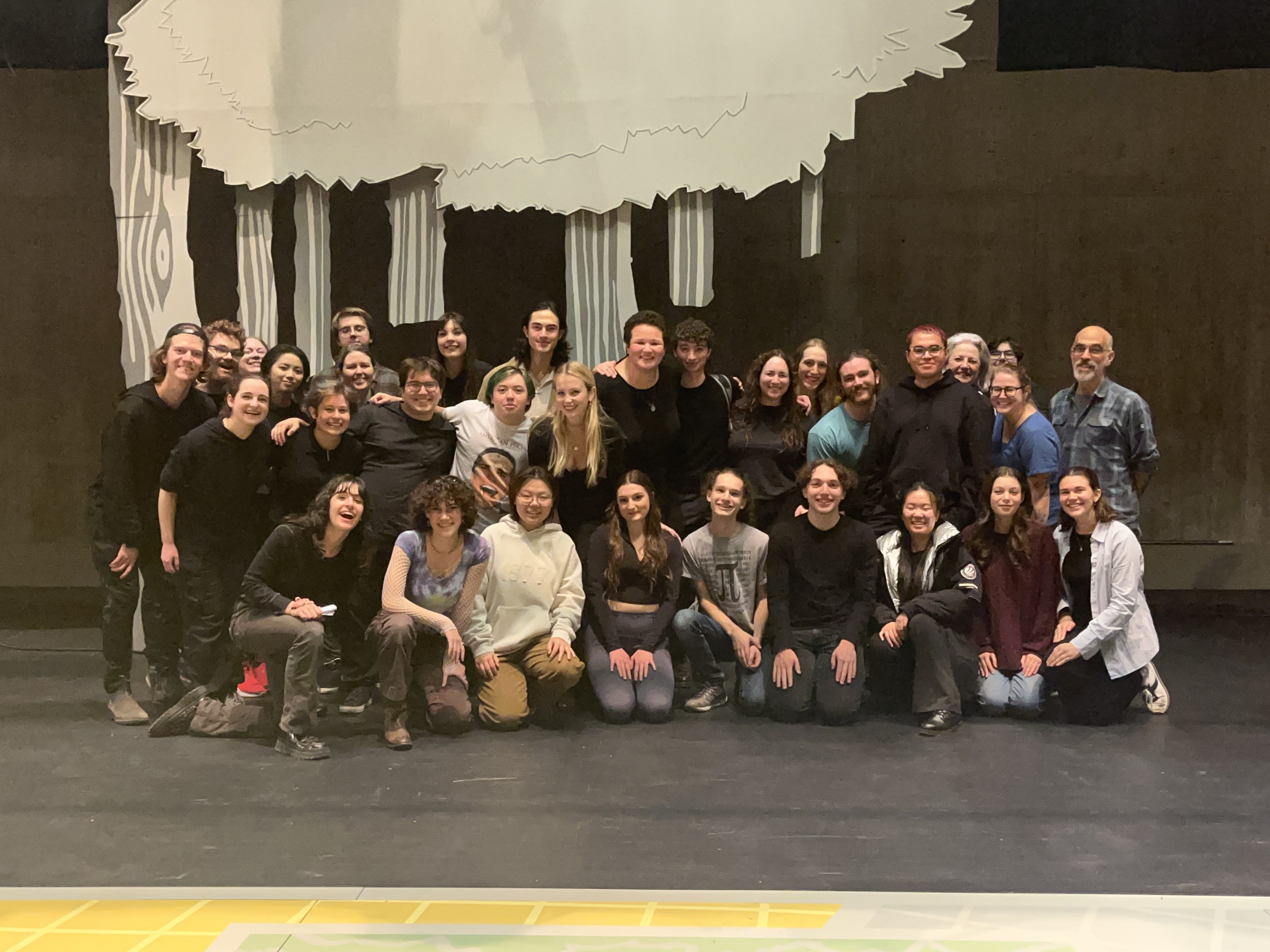
c/o WesTheater instagram
“Honestly, this rehearsal process was so lovely,” Gull said. “I looked forward to going to rehearsal every day. And that sounds so cheesy, but it’s true. It was such a great environment and I feel like by the end everyone was really comfortable with each other. It felt like a family.”
Caleb Henning can be reached at chenning@wesleyan.edu.
Saakshi Challa can be reached at schalla@wesleyan.edu.
Comments are closed